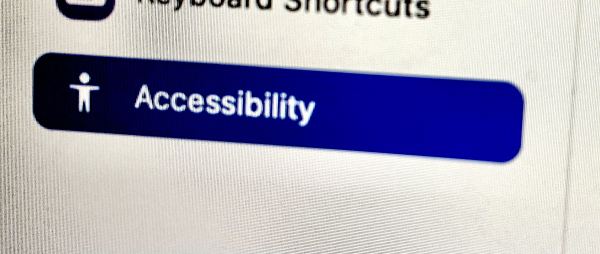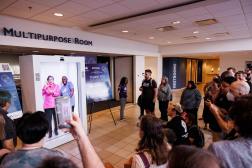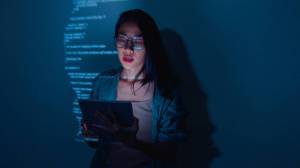Education equity advocate Ruha Benjamin urges teachers to embrace hacking mindset

DENVER – Educators need to help students “hack” the hidden “default settings” of society’s biases that have been unwittingly engineered into the technology we use, asserted a leading Princeton University educator, speaking at ISTE 2016 here Tuesday.
“Teachers, if actually unified and empowered, can change the direction of history,” said Ruha Benjamin, assistant professor in the Department of African American Studies at Princeton University.
Benjamin, who specializes in the interdisciplinary study of science, medicine, and biotechnology, race-ethnicity and gender, made an impassioned plea for educators to recognize the parallel and often stratified worlds their students experience and how technology tends to reinforce those worlds.
Speaking to several thousand teachers and edtech specialists, Benjamin described a societal landscape today that is in crisis, and where children “live in parallel realities,” pointing to entrenched social practices that can empower some and handicap others along racial, financial and gender fault lines.
“Schools are places where the next generation either comes alive with possibilities or is crushed by the weight of the odds stacked against them,” she said.
If society and educators “adopt technology without wrestling this parallel, apartheid-like reality, then the gap [in educational equity and opportunities] 30 years from now will be even wider than it is today,” she argued.
“Our role as educators is to incubate a better world in the minds and hearts of our students,” she said.
[Read more of this week’s coverage from ISTE 2016.]
The Princeton professor highlighted four themes that educators should consider more deeply, revolving around the need for greater imagination, instructional design and creative hacking in the classroom, and recognizing several common fallacies in education.
“The power to make our dreams come true is distributed in a radically unequal way,” she said. Recognizing those inequities is an important first step to reimagining instruction in the classroom, she said.
Benjamin pointed to last year’s widely publicized arrest of a Texas teenager, Ahmed Mohamed, whose creativity in building a homemade alarm clock led to a his surprising arrest, when authorities mistook his work for a bomb.
“It’s doubtful he would have been arrested if his name was Adam,” Benjamin said.
Those biases creep into the way technology works, she stressed.
“The use of data mining, scoring and predictive software is proliferating, and it can amplify historical discrimination,” she said.
It’s possible to redesign these programs to be aware of social, racial, ethnic and class biases. “But it takes time and runs counter to the rush to get tools to market. It demands slower, and more socially conscious tech development,” she said, and educators have a role in helping raise that consciousness.
When it comes to design, who we imagine will take advantage of technology, and which voices are missing when decisions are being made about technology, both plays an outsized role in how technology ultimately shapes peoples’ lives and what students learn, she said.
By not recognizing the biases that creep into technology, “we unwittingly build those gaps in the default settings,” she said.
At the same time, educators have the opportunity to teach children to change the underlying social codes wrapped up in the technical coding.
She urged educators to think more broadly about the impact of technology. “The common understanding of what counts as technology is far too limited,” she said. “We have material technology in mind, but what about the settings, the unspoken rules and norms built into the technology?”
“As educators, we can’t just help students succeed at the game of life; we have to develop technologies that can help them reform the status quo.”
Benjamin also urged the audience to do more to embrace the notion of hacking in the classroom. She contrasted hacking from gaming, which she characterized as being about recreation, competition, and consumption. Hacking, on the other hand, is characterized by creativity and mastery.
“The question for us is, ‘how do we make our schools laboratories of democratic participation, rather than sites where inequity is reproduced?’” she said.
Contact the writer at wyatt.kash@scoopnewsgroup.com or on Twitter @wyattkash.




